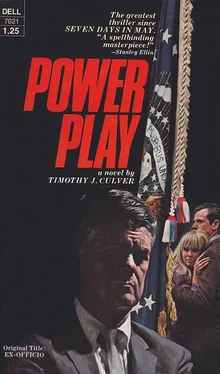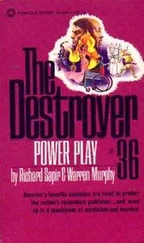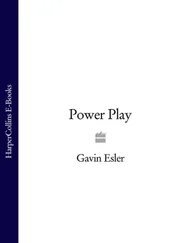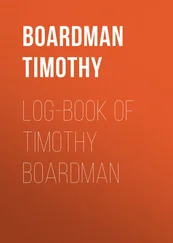Timothy Culver - Power Play
Здесь есть возможность читать онлайн «Timothy Culver - Power Play» весь текст электронной книги совершенно бесплатно (целиком полную версию без сокращений). В некоторых случаях можно слушать аудио, скачать через торрент в формате fb2 и присутствует краткое содержание. Город: New York, Год выпуска: 1971, ISBN: 1971, Издательство: Dell Books, Жанр: roman, на английском языке. Описание произведения, (предисловие) а так же отзывы посетителей доступны на портале библиотеки ЛибКат.
- Название:Power Play
- Автор:
- Издательство:Dell Books
- Жанр:
- Год:1971
- Город:New York
- ISBN:978-0440070214
- Рейтинг книги:5 / 5. Голосов: 1
-
Избранное:Добавить в избранное
- Отзывы:
-
Ваша оценка:
- 100
- 1
- 2
- 3
- 4
- 5
Power Play: краткое содержание, описание и аннотация
Предлагаем к чтению аннотацию, описание, краткое содержание или предисловие (зависит от того, что написал сам автор книги «Power Play»). Если вы не нашли необходимую информацию о книге — напишите в комментариях, мы постараемся отыскать её.
Occupation: Former President of the United States
Problem: Obsessive desire for power.
Loved and hated more than any man on earth, commanding absolute loyalty from the men and women who once had served him, defying the government he once had headed, Bradford Lockridge pursued his final and possibly insane vision of glory...
Power Play — читать онлайн бесплатно полную книгу (весь текст) целиком
Ниже представлен текст книги, разбитый по страницам. Система сохранения места последней прочитанной страницы, позволяет с удобством читать онлайн бесплатно книгу «Power Play», без необходимости каждый раз заново искать на чём Вы остановились. Поставьте закладку, и сможете в любой момент перейти на страницу, на которой закончили чтение.
Интервал:
Закладка:
Within a forty-square-mile rectangle north and west of Lancashire, bordered by four secondary roads, one of them not even numbered, there is nothing but woods and an occasional farm. In a farmhouse in a wooded fold of hills in this section on the morning of Friday, the ninth of November, ten men sat and discussed their plans for the day. Two were Chinese, eight were American. The Americans were a dissident splinter group formed by recent disruptions within the Progressive Labor party, one of the old-time American Communist party schisms that had come into an unexpected belated flowering of prominence in the late sixties. Throughout the sixties, while Stalinist and Trotskyite schisms saw themselves fading into irrelevance and obsolescence, Progressive Labor was firmly Maoist, hitching its wagon to the star from the East and riding the wave of polarization into the seventies. China was Progressive Labor’s heaven then, as Russia had been for the equivalent radicals of the thirties. (“I have seen the future, and it works.”) With the death of Chairman Mao, and with China now in a strong anti-Mao reaction — much like Russia’s de-Stalinization period — Progressive Labor and the other American Maoist groups now considered China merely one more enemy in a world already swarming with opponents.
Not all the members of Progressive Labor, however, agreed with this policy. The cult-of-personality specter was raised again, party meetings grew louder and less coherent, and by now Progressive Labor was progressively factionalizing itself out of existence. The radical left, after a heady period of national and international influence in the late sixties, was bickering its way back into its more usual irrelevance.
The eight Americans in the farmhouse northwest of Lancashire were members of the Twelfth of July movement (TOJ), a splinter of a faction from a schism of Progressive Labor, so far removed from its origin that Progressive Labor hadn’t yet bothered to denounce it. The Twelfth of July movement, named after an obscure event in radical politics during the period when Progressive Labor was taking over the Students for a Democratic Society (SDS), saw its true allegiance not to Mao, and certainly not to Progressive Labor, but to China, which it saw as the source of a world-wide revolutionary movement for peace and freedom and the end of capitalism.
The eight TOJ members were all young men in their early or middle twenties, all Caucasian, all looking like normal upper-middle-class young men, with neat clothing, cropped hair and shining beardless jaws. Until yesterday, however, they had looked much different: bearded, hairy, dressed either dirtily or extravagantly. They considered themselves to be currently in disguise, and all were proud of the sacrifice they had made in shaving and getting crew-cuts, and yet their faces, their personalities, their backgrounds, who they were, shone through much more clearly now than they had done before yesterday.
Their histories were all more or less the same. All had been college students during the sixties, all had been caught up in the adventure and challenge of a society to be changed by its brightest young, all had suffered police violence and arrest, most had been expelled from at least one college, all had made their sacrifices light-heartedly and without any real understanding of the consequences, and all by now understood what those consequences were. Society, in effect, had cast them out. There were no blacklists, there was no longer any organized harassment, but there didn’t need to be. They had police records, and they lacked college degrees, a combination that automatically closed the door to any employment appropriate to their class. With the working class firmly right-wing since 1968 and becoming more so with every passing month, it was very difficult for them to find jobs of any kind; no union would accept their membership applications, and no right-thinking American workingman (flag decal on car window) wanted to be associated with them.
It was no wonder they, and the thousands like them, clung to the idea of revolution; only after a total upheaval of society would there be any chance of their returning to their original favored position in the social structure. In refusing the plea of some Senators the year before to pass a general amnesty for the political prisoners and the exiled war protesters and all the other shattered remnants of the American Revolution of 1968–69, Congress had sown a wind that could yet give these eight men the social catastrophe their blighted lives required.
In the meantime, their present hopes lay with China, which meant that when they’d been approached by Chinese agents to assist China in her undercover work within the United States — with the assurance that they would never be asked to cooperate in anything against the people (as opposed to the government) of the United States — they had agreed at once. Their help until today had taken only minor forms, but today they would assist in a major way.
They’d been shown the correspondence between Bradford Lockridge and the Chinese. The conversion of this man, formerly one of their most-hated enemies, had delighted them, was one of the most hopeful signs in years of their eventual victory. The information that Lockridge was being forcibly detained by his family confirmed their ideas of Establishment villainy, and they were proud to assist in wresting Lockridge from its clutches.
The two Chinese were middle-aged men, seasoned agents who knew how to take available amateur material and turn it into a useful short-term force. Their base was six hundred miles farther north, in Montreal, where an extreme radical offshoot of the Free Quebec separatist movement was also in active cooperation with Chinese espionage, and where a plane was ready to take Lockridge to Vancouver for transfer to another plane for the flight to Peking. From this farmhouse to Montreal, Lockridge would travel in safety and comfort in the rear of a delivery van now parked behind the farmhouse. The van was marked Penn-Can Delivery Service, and bore New York State license plates. Ontario plates were stored in the van, ready to be put on after they had crossed the unguarded border on one of the back roads above Malone, New York. The interior of the van had been carpeted, and furnished with an easy chair, two tables and a reading lamp. There were also magazines and books for Lockridge to read, including a picture book of the area around Peking. A chemical toilet had been installed in one corner, and an intercom system would permit Lockridge to speak, if necessary, with the driver.
Inside the farmhouse, the two Chinese agents were going over the plan one last time with the eight Americans. The Chinese would not take an active part in Lockridge’s rescue, because of their high visibility in a Caucasian city, but would wait here at the farmhouse for the eight — and Lockridge — to return.
Now they were ready. They solemnly shook hands all around, and the eight left the house. Outside were three automobiles — green Chevrolet, tan Mercury, maroon-and-black Pontiac — into which the eight sorted themselves, and drove away, down the deserted dirt road through woods and past other abandoned farm houses to the blacktop road which would lead them to Lancashire.
ii
The house of the President of Lancashire University was a large rambling brick structure across the highway from the campus itself, between the highway and the river. The sloping lawn leading from the rear of the house to a wooden dock and broad concrete steps at the river had been one of Elizabeth’s joys, though of course these days the river was polluted and no longer useful for swimming and fishing. But the view was still beautiful, at every season.
Elizabeth’s body lay in the living room, where it had been since Wednesday afternoon. Sterling had continued to stay in the house, joined by his two daughters-in-law, Howard’s wife Grace and Edward’s wife Janet, the latter there with Edward from Paris. The rest of the family had assembled in town last night and this morning, most of them staying at one of the motels on the highway, Wellington and one or two others staying at Lancashire House, the old hotel in town. Bradford had come up this morning by car, accompanied by Evelyn and Howard and (as though fortuitously) by Gregory Holt; a car full of young men from the family, Thomas Wellington and Albert Bloor Jr. and Robert Pratt (considered family now) and George Holt, had followed Bradford’s Lincoln the whole way.
Читать дальшеИнтервал:
Закладка:
Похожие книги на «Power Play»
Представляем Вашему вниманию похожие книги на «Power Play» списком для выбора. Мы отобрали схожую по названию и смыслу литературу в надежде предоставить читателям больше вариантов отыскать новые, интересные, ещё непрочитанные произведения.
Обсуждение, отзывы о книге «Power Play» и просто собственные мнения читателей. Оставьте ваши комментарии, напишите, что Вы думаете о произведении, его смысле или главных героях. Укажите что конкретно понравилось, а что нет, и почему Вы так считаете.












